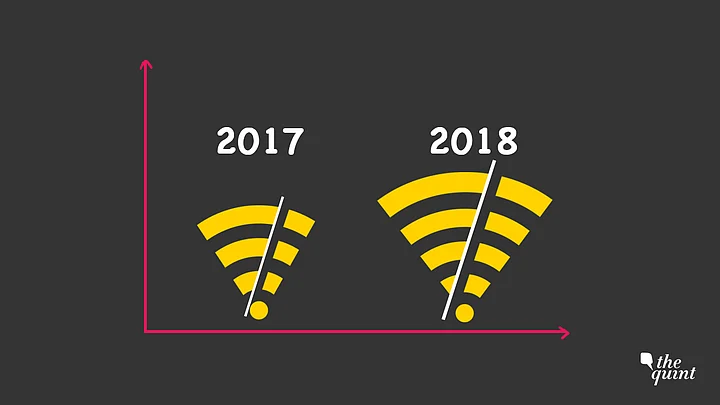There were 21 previously unreported internet shutdowns in Rajasthan between August 2017 and 1 May 2018, an RTI query has revealed. Twelve of those shutdowns were ordered in 2018, making it the WORST year for open internet in India. With five months still left in the year, the RTI revelations take the current national shutdown count for 2018 from 70 to 82, thereby surpassing 2017’s record of 79 .
Software Freedom Law Centre (SFLC), a donor-supported legal services organisation, has been tracking internet shutdowns in India since 2012. This data, along with insights drawn from it, are publicly available on an interactive internet shutdown tracker. This website has been among the most credible sources of information about internet shutdown numbers in the country.
“We, as an organisation, rely on media reports and citizen reporters for information on shutdowns. Nevertheless, all information about shutdown continues to be secondary and hence, some could be absent from the tracker. Therefore, an RTI query can help us get a more accurate picture,” said a spokesperson for SFLC.in.
A Crying Shame
While the tracker currently indicates that India has hit the kill switch 199 times since 2012, this new revelation will push it to 220. It is worth noting that while only three shutdowns were ordered in 2012, the numbers have been on an upward curve since then and currently stands at 82 in the first seven months of 2018. Rajasthan has shown a similar upward curve as well; from one in 2015 to 21 this year already.
The Rajasthan government’s obsession with the internet shutdowns implies that the western state ranks second only to Jammu and Kashmir in pushing its people into digital darkness. If India wears the ignominious crown of ordering the most number of shutdowns in the world, then Rajasthan would surely be its crown jewel.
The state government had ordered a two-day long shutdown on 14 and 15 July to prevent cheating during its Constable Recruitment Examinations. It had done the same in February during the statewide Rajasthan Eligibility Examination for Teachers (REET).
“An incredible stretch of logic,” is how SFLC.in described some of the reasons that have been cited for shutdowns in Rajasthan and other parts of the country. “Be it the erstwhile Section 144 of the Code of Criminal Procedure or the new formal internet suspension rules, the language suggests that they should be imposed only during a public emergency or for public safety,” the spokesperson added.
According to the SFLC.in’s blog, in order to get a sense of the true extent of unreported shutdowns, the organisation in its RTI asked, “What is the exact number of internet shutdowns that were ordered in Rajasthan during 07.08.2017 to 01.05.2018?”. This time-frame was chosen because the Suspension of Telecom Services (Public Emergency and Public Safety) Rules, 2017 – the current enabling legislation for Internet shutdowns – was enacted on 8 August, 2017.
The Problem With India’s Shutdown Rules
The Internet Suspension Rules do not specify grounds under which a state or central authority can order a blackout. It only specifies who can make the orders. This means that a government is theoretically free to order a district or state to go offline on any ground it deems fit.
Moreover, the Ministry of Communications passed the rules quietly without any prior public consultation. This was a failure to honour a multi-stakeholder commitment to involve non-government actors in matters related to internet policy
Shutdowns are a Human Rights Violation
India’s shameful distinction of going offline more than any other country has serious human rights implications for its citizens. Denying access to the internet amounts to censorship and a violation of freedom of speech by restricting access to freely seek, receive and disseminate information and opinion.
According to a report published by the Indian Council for Research on International Economic Relations (ICRIER), between 2012 and 2017, India lost 16,315 online hours because of shutdowns which cost the country approximately $3.04 billion.
At the ground level, an offline environment can also deny people access to food and to livelihood. The Internet Freedom Foundation had tweeted on 13 August, “Due to the imposition of POS (point of sale) device authentication for rations (which have their own concerns), such internet shutdowns deprive people of food.”
(At The Quint, we question everything. Play an active role in shaping our journalism by becoming a member today.)
